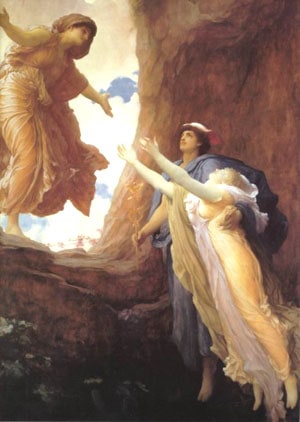 Demeter is the Greek goddess of harvest. She is one of the twelve Olympians. Her daughter is Persphone, the goddess of spring. Persphone was captured by Hades, the god of the Underworld, and tricked into marrying him. She spends half of her time in the Underworld and half of her time in the mortal world. Her absence is what causes the seasons to change. Demeter was distraught when Persphone was taken.
Demeter is the Greek goddess of harvest. She is one of the twelve Olympians. Her daughter is Persphone, the goddess of spring. Persphone was captured by Hades, the god of the Underworld, and tricked into marrying him. She spends half of her time in the Underworld and half of her time in the mortal world. Her absence is what causes the seasons to change. Demeter was distraught when Persphone was taken. The Structure:
Demeter is written as a broken sonnet. It had fourteen lines, and ends with a rhyming couplet. Like a sonnet, a problem is introduced to begin with and as the poem progresses, a resolution is found.
Close Reading:
"Where I lived - winter and hard earth" - the poem is told from Demeter's perspective. She is talking of the world without her daughter.
"I sat in my cold stone room" - The room mirrors her feelings towards the loss of her daughter. Without Persphone, everything is "cold". A "cold stone room" could also be a reference to Hades' palace in the underworld, where Persphone resides, showing that both mother and daughter are at a loss.
 "choosing tough words, granite, flint/ to break the ice." - Emjambement used to show how broken Demeter feels. She tries a multitude of methods to "break the ice". The tripling adds emphasis to her sruggles.
"choosing tough words, granite, flint/ to break the ice." - Emjambement used to show how broken Demeter feels. She tries a multitude of methods to "break the ice". The tripling adds emphasis to her sruggles. "My broken heart-/I tried that, but it skimmed,/flat, over the frozen lake." - Demeter is so desperate for her daughter's return, she'd almost sacrifice herself. Duffy uses a metaphor, that Demeter's "broken heart" is like the "granite, flint" she tried before. Her heart has become just as cold as those things.
"She came from a long, long way,/but I saw her at last, walking," - Persphone is returning from the Underworld. Demeter is the first to notice her, even though Persphone was a long way off. Her devotion to her daughter is displayed in her eagerness for Persphone to return.
 "my daughter, my girl" - the repetition of "my" shows how possessive Demeter is of her daughter, and how much she means to her. She wishes that Persphone could be her's all year round.
"my daughter, my girl" - the repetition of "my" shows how possessive Demeter is of her daughter, and how much she means to her. She wishes that Persphone could be her's all year round. "across the fields,/in bare feet, bringing all spring's flowers/to her mother's house." - Persphone's return represents the coming of spring. Flowers symbolise her beauty, and her "bare feet" suggest innonence, like she knows nothing would hurt her.
"I swear/the air softened and warmed as she moved," - the personification of nature, feeling just as happy as Demeter at Persphone's return.
"the blue sky smiling, none to soon/ with the small shy mouth of a new moon" - rhyming coouplet.
Themes: Like Anne Hathaway, Demeter lacks a sense of anger at men, or a critical opinion of men as most of the other poems within The World's Wife. Demeter is portrayed, first and foremost, as a mother, not a lover, that has lost the one she loves the most: her daughter. In mythology she is not linked with any god or man in particular. However, the poem could show hate towards Hades, who was the cause of Demeter's loss.
Although Demeter is an independant woman, she relies on her daughter for happiness. Women can be strong on their own, but without love, a life is half lived.
This was very helpful, thank you
ReplyDeletehelpful but at the same time a waste of my life
ReplyDeleteThis comment has been removed by the author.
ReplyDeleteThis comment has been removed by the author.
ReplyDelete